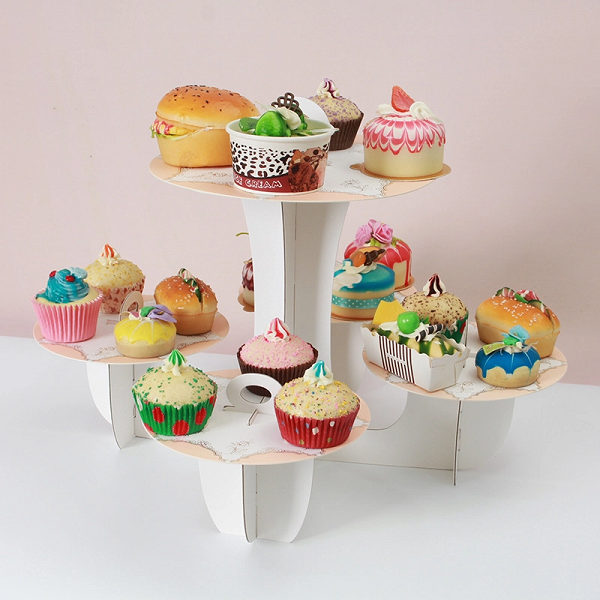Content Menu
● Why Display Stands Matter
● Types of Display Stands
>> Countertop Display Stands
>> Floor Display Stands
>> Rotating Display Stands
>> Custom Shaped Display Stands
>> Multi-Tiered Display Stands
● Key Factors to Consider When Choosing Display Stands
>> Product Size and Weight
>> Material Selection
>> Branding and Customization
>> Space Availability
>> Ease of Assembly and Portability
>> Budget
● Step-by-Step Guide to Selecting the Perfect Display Stand
>> Step 1: Define Your Objectives
>> Step 2: Analyze Your Product Line
>> Step 3: Evaluate Your Retail Environment
>> Step 4: Explore Customization Options
>> Step 5: Request Prototypes or Samples
>> Step 6: Plan for Logistics
● Enhancing Display Stands with Technology and Creativity
>> Incorporating Interactive Features
>> Lighting Effects
>> Eco-Friendly Display Solutions
>> Modular and Flexible Designs
● Common Mistakes to Avoid
● Maintenance Tips for Display Stands
● Conclusion
● Frequently Asked Questions
>> 1. What is the most important factor when choosing a display stand?
>> 2. Are custom display stands worth the investment?
>> 3. How do I maintain my display stands?
>> 4. Can display stands be reused for different products?
>> 5. What materials are best for eco-friendly display stands?
In today's highly competitive retail environment, display stands have become a vital tool for brands to capture attention, showcase products, and drive sales. Whether you're launching a new product, rebranding, or simply aiming to stand out among competitors, the right display stand can make all the difference. This comprehensive guide will walk you through every aspect of selecting the perfect display stand for your product line, ensuring your merchandise not only looks appealing but also maximizes its commercial potential.

Why Display Stands Matter
Display stands are more than just holders for your products. They are strategic marketing tools that:
- Enhance product visibility
- Organize merchandise efficiently
- Communicate brand identity
- Encourage impulse purchases
- Optimize retail space
A well-chosen display stand can transform an ordinary product presentation into an engaging customer experience.
Types of Display Stands
Countertop Display Stands
Ideal for small items and impulse buys, these stands are placed near cash registers or high-traffic areas. They are perfect for showcasing items like notebooks, playing cards, stickers, and flashcards. Their compact size allows them to fit on counters without overwhelming the space, making them a convenient option for retailers looking to maximize sales in limited areas.
Floor Display Stands
These are larger, free-standing units that can hold a significant amount of merchandise. Floor display stands are suitable for products such as boxes, booklets, and larger packaging. They serve as focal points in retail spaces, drawing customers' eyes and guiding them toward featured products. Their versatility allows for multi-tiered shelving, hooks, or compartments tailored to various product types.
Rotating Display Stands
Rotating stands allow customers to browse products from all angles. They are excellent for labels, stickers, and small packaged goods. The spinning feature encourages interaction, which can increase the time customers spend engaging with your products—a key factor in boosting sales.
Custom Shaped Display Stands
Custom stands can be tailored to your brand's unique needs, offering creative shapes and designs that reflect your product's identity. These stands often incorporate brand colors, logos, and thematic elements that reinforce brand recognition and appeal directly to the target audience.
Multi-Tiered Display Stands
These stands maximize vertical space and are ideal for displaying a wide variety of products in a compact area. Multi-tiered designs help organize products by category or size, making it easier for customers to locate what they want while maintaining a neat and attractive presentation.
Key Factors to Consider When Choosing Display Stands
Product Size and Weight
Understanding the dimensions and weight of your products is crucial. Heavier items require sturdier stands made from durable materials like metal or thick plastic, while lightweight products can be displayed on cardboard or thinner plastic stands. The stand must support the product safely without tipping or collapsing.
Material Selection
Choosing the right material affects both the durability and the aesthetic of your display stand.
- Cardboard/Paperboard: Lightweight and cost-effective, these are ideal for temporary promotions or seasonal displays. They offer high customizability with vibrant printing options but are less durable.
- Plastic: Durable and easy to clean, plastic stands are suitable for long-term use and can withstand moisture or rough handling.
- Metal: Provides maximum strength and longevity, perfect for heavy or high-value items. Metal stands often convey a premium feel.
- Wood: Offers a natural, warm aesthetic, suitable for eco-friendly or artisanal brands. Wood can be customized with stains or paints to match branding.
Branding and Customization
Your display stand should be an extension of your brand identity. Custom printing, color schemes, and unique shapes help your products stand out on crowded shelves. Consider incorporating your logo, tagline, or brand colors prominently. Customization also allows you to tailor the stand's messaging to specific campaigns or product launches.
Space Availability
Measure your retail or exhibition space carefully. The display stand should fit comfortably without obstructing customer movement or other merchandise. Consider the stand's footprint and height to ensure it complements the store layout and lighting.
Ease of Assembly and Portability
If your display stands will be used at multiple locations or events, ease of assembly and portability are essential. Flat-pack designs that can be quickly assembled without tools save time and reduce labor costs. Lightweight materials also facilitate transportation.
Budget
While it's tempting to opt for the cheapest option, investing in quality display stands can yield better returns through enhanced product presentation and durability. Balance your budget with your branding goals and the expected lifespan of the display stand.

Step-by-Step Guide to Selecting the Perfect Display Stand
Step 1: Define Your Objectives
Clarify what you want to achieve with your display stand. Are you introducing a new product, increasing brand awareness, or promoting a seasonal sale? Your objectives will influence the type and design of the stand.
Step 2: Analyze Your Product Line
Group your products by size, weight, and packaging style. This will help determine the most suitable display stand types and configurations.
Step 3: Evaluate Your Retail Environment
Consider the layout, lighting, and customer flow of your retail space. Choose display stands that complement your store's aesthetics and enhance the shopping experience.
Step 4: Explore Customization Options
Work with your display stand supplier to explore custom shapes, colors, and branding elements that make your products stand out. Customization can also include interactive elements or special finishes.
Step 5: Request Prototypes or Samples
Before placing a large order, request prototypes or samples to assess quality, durability, and visual appeal. Testing allows you to make adjustments before committing to mass production.
Step 6: Plan for Logistics
Ensure your chosen display stands can be shipped, stored, and assembled efficiently. Consider flat-pack designs for easier transportation and storage.
Enhancing Display Stands with Technology and Creativity
Incorporating Interactive Features
Adding technology such as QR codes, NFC tags, or small digital screens can engage customers by providing additional product information, videos, or promotions. Interactive displays create a memorable shopping experience and encourage deeper product exploration.
Lighting Effects
Integrating LED lighting into display stands can highlight key products and create a visually striking presentation. Spotlights or backlighting can draw attention and make your products pop, especially in dim or crowded retail environments.
Eco-Friendly Display Solutions
Sustainability is increasingly important to consumers. Using recyclable or biodegradable materials for your display stands can enhance your brand's eco-conscious image. Additionally, modular designs that can be reused or repurposed reduce waste and long-term costs.
Modular and Flexible Designs
Modular display stands allow you to rearrange shelves, compartments, or panels to accommodate different products or seasonal changes. This flexibility extends the life of your display stand investment and keeps your presentation fresh.
Common Mistakes to Avoid
- Choosing stands that are too large or small for your products, which can either overwhelm or underwhelm customers.
- Overlooking the importance of branding, resulting in generic displays that fail to attract attention.
- Ignoring the retail environment and customer flow, leading to obstructive or poorly placed stands.
- Compromising on quality to save costs, which can damage your brand image if stands break or look cheap.
- Failing to test prototypes before mass production, risking costly mistakes in design or functionality.
Maintenance Tips for Display Stands
To keep your display stands looking their best and functioning properly:
- Clean regularly to remove dust, dirt, and fingerprints.
- Inspect for damage or wear and repair or replace parts as needed.
- Update graphics or branding elements to keep the display current.
- Rotate products to maintain a fresh and engaging presentation.
- Store unused stands in a dry, safe environment to prevent damage.
Conclusion
Selecting the perfect display stand for your product line is a strategic decision that can significantly impact your brand's success. By carefully considering your objectives, product characteristics, retail environment, and branding needs, you can choose display stands that not only showcase your products effectively but also elevate your brand image. Remember, the right display stand is an investment in your brand's future—choose wisely, and watch your products shine.

Frequently Asked Questions
1. What is the most important factor when choosing a display stand?
The most important factor is ensuring the display stand matches your product's size, weight, and branding requirements. It should enhance product visibility and fit seamlessly into your retail environment.
2. Are custom display stands worth the investment?
Yes, custom display stands can significantly boost brand recognition and sales by creating a unique and memorable shopping experience for customers.
3. How do I maintain my display stands?
Regular cleaning, inspecting for damage, updating graphics, and proper storage are essential for maintaining the appearance and longevity of your display stands.
4. Can display stands be reused for different products?
Many display stands, especially modular or adjustable designs, can be repurposed for various products, making them a cost-effective solution for changing promotions.
5. What materials are best for eco-friendly display stands?
Recyclable paperboard, biodegradable plastics, and sustainably sourced wood are excellent choices for brands seeking environmentally friendly display stand options.
































